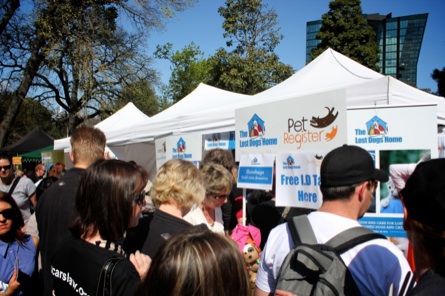February 23, 2012Comments are closed.cats, dogs

How much money should a reputable animal welfare organisation take from a live-puppy-sales pet shop?
I’m sure you’ll agree that the answer is none. Any reputable animal welfare organisation would recognise that a pet store which sold puppies – likely the offspring of puppy farm mothers – is the antithesis of their mission to improve welfare outcomes for pets.
A couple of years ago, when animal advocates saw that one of Australia’s largest pet shops had encouraged customers buy an extra $50,000 worth of product to donate to the Lost Dogs Home, and were planning on driving for twice the donation the following year, they were understandably outraged. The Lost Dogs Home was forced to reject the second donation, and in 2011 partnered with the Oscar’s Law campaign, rallying as one of the ‘good guys’ on the steps of Melbourne’s Parliament House.

By the end of the year, The Lost Dogs Home was the self proclaimed leader of anti-puppy farming sentiment in Melbourne, inviting no less than the Premier down to show just how committed they were to stamping out puppy farms;
“We greatly welcome these changes, and I think the days of puppy farms are numbered,” he said. “It’s fantastic to see the new government following through on their election promises.”
So with all this fanfare, have the Lost Dogs Home been completely unfront with their supporters?
The Passion for Pets stores in Bulleen and Thornbury feature “enclosures for pups and kittens big enough to let you have a good look at them”, while new puppies “come in each Thursday”. They advertise their available pets on Trading Post.
In Northlands Shopping Centre Preston, Pets Family is “near Target”. They specialise in ‘Schnoodles’ and ‘Cavachons’ and advertise their available pets on Aussie Traders.

Both these stores, like hundreds of others across the state, are required to microchip their puppies before sale. Since 2005 all Domestic Animal Businesses (pet shops, pounds, shelters and commercial breeders) must microchip cats and dogs, while veterinarians are responsible for microchipping the puppies and kittens of backyard breeders to comply with new microchipping laws enacted early this year.
Both Pets Family and Passion for Pets use National Pet Register microchips and registration. The Lost Dogs Home is making money from the sale of each one of the puppies above and many, many more like them.
The National Pet Register began as a non-profit program to provide free ID tags to Australian pets, however with the rollout of the various compulsory microchipping laws in Victoria, the Register expanded – their database today swelling to over 1 million contacts, and the organisation adding over 80,000 microchips to the database in the 2010/11 year alone (with around 13,000 of the free tags distributed)
The National Pet Register accepts microchip registrations from animal businesses; animal shelters, council pounds, veterinary clinics, breeders and pet shops. They charge about $10 for a microchip & registration package.
With the majority of pets needing chipping being new puppies and kittens, of the 80,000 microchips being added annually, how many are coming from commercial breeders, backyard breeders and pet stores? Just how much money is being pumped into the organisations’ coffers, directly from the bulk production of pets?
Should an animal welfare organisation develop an income stream from farmed puppies?
You always raise the bar on facts and information – thanks Paul – Great point, incisive point.
“Should an animal welfare organisation develop an income stream from farmed puppies?” – no, it shouldn’t, and affiliation with the Pets Paradise ‘donation drive’ was a poor choice. But I disagree that NPR providing microchips constitutes LDH directly profiting from the bulk production of pets.
You’ve mistaken cause and effect: pets are not produced so that they can be microchipped. Microchip registries exist because pets need them.
LDH have found a way to profit from the provision of a service that benefits animals, not one that promotes the production of more animals. Irrespective of your opinions on whatever else LDH does, there’s nothing wrong with this in itself.
“… I disagree that NPR providing microchips constitutes LDH directly profiting from the bulk production of pets.”
Nope, you’re wrong. The more puppies the farmers produce and chip through the service, the more relationships with pet shops the NPR has, the more it profits. It’s not causation, but it most certainly is correlation.
By your logic, any shelter can offer any service to puppy farmers and their ilk, as long as ‘the pets need it’. Should they offer whelping services to farmers through their shelter vets? Pets need vets and they were going to give birth anyway. Maybe groups could offer retail food deliveries to farmers – that’d be a great little earner for their ‘non-profits’ & pets need food after all.
It’s ridiculous that anyone would find pet shops paying the Lost Dogs Home $10 per pet shop puppy an appropriate income stream for a group who claims to be working to reduce puppy farming and benefit pet welfare.
I disagree with your logic here too. You admit yourself that it’s not causation, only correlation. Now please explain why a correlation that is completely unrelated to causation is a negative thing. You’ll also find a strong correlation between height and reading ability (because babies and young children are generally worse at reading than full-grown adults). By your logic, if we consider illiteracy a negative trait, then being of short stature must also be a negative trait.
It is a logical fallacy to condemn the LDH for providing NPR chips. The need for microchips is now a fixed cost of producing companion animals. I’d much rather that that fixed cost go towards rehoming animals in need than go to some other company that won’t do anything benevolent with it (and once again, I’m only talking about this particular example; I’m not saying that LDH has a perfect track record for rehoming animals).
Similarly, if a farmer were ever to actually go to a veterinarian for whelping help (and I’d applaud if one ever did rather than making a hash of it themselves…), I’d prefer if the cost of that went to support homeless animals, rather than buying after-work drinks for whatever other private vet would be consulted. Presumably a farming operation would be somewhat less viable if veterinary costs were sought more often, so I’m all for it.
Fixed costs such as these (or the provision of food), are necessary for pet farmers: they’ll be paying someone at some point, and if they happen to pay someone who will pour that money back into animals in need, so much the better. The problem arises when LDH is directly implicit in increasing the productivity of farmers (as in the Pets Paradise example): that is, if causation is proven. The ‘guilt by association’ theme you are espousing here is nothing but a cheap scare tactic, and only detracts from what other meaningful criticisms you have.
*whistles* wow.